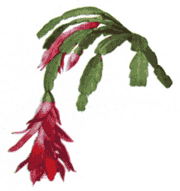
Is your Christmas cactus misbehaving?
Does it wilt, shrivel, look pale or refuse to bloom?
By Marion Owen, Fearless Weeder
for PlanTea, Inc. and
Co-author of Chicken Soup for the Gardener's Soul
FEATURE ARTICLE:

Tom Hanks' "Power of Four" solution
More good stuff:
Who is Marion Owen?
FAQs about PlanTea
Search Marion's articles, tips and recipes
Why grow organic?
News and press releases
Read love letters
How to link to this site
Need a speaker?
How to contact Marion
Visiting Alaska?
Come to Kodiak Island!
Go to home page

Marion's UpBeet Gardener
Newsletter has been
replaced by Marion's blog
which you can find at:
www.marionowen.wordpress.com
 Have
you ever had a bad case of the hiccups? I mean, really halting hiccups,
the kind where you can't eat, drink,, talk on the phone, or do anything
gracefully.
Have
you ever had a bad case of the hiccups? I mean, really halting hiccups,
the kind where you can't eat, drink,, talk on the phone, or do anything
gracefully.
Hiccups, like tripping on a stair or missing your flight, throw you out of sync.
Plants can also suffer from hiccups. For example, if you don't get around to planting those seed potatoes you bought at the garden center, the spuds sprout and shrivel in the paper bag where you left them in the garage; or the maintenance crew slices into the bark at the base of the neighborhood's maple tree while weed-wacking around the trunk.
Or, on the indoor front, your Christmas cactus doesn't bloom when it should, that is, in time for the holidays. A hiccup is to blame here as well. Read on, and you'll discover what causes one Christmas cactus to put out dozens of trumpet-like flowers, while another one just sits there. I'll give you a hint: It, has a lot to do with mistaken identities.
"It's all in the name," the saying goes, except in this case, the name
"cactus" is  misleading and confusing. This plant is not from the hot,
sandy desert. It’s an epiphyte (EH-pih-fite), a plant that lives
in the crooks of tree branches, and a native of the humid jungles of coastal
Brazil. The poor plant would rather have a shower than bathe in the sun.
misleading and confusing. This plant is not from the hot,
sandy desert. It’s an epiphyte (EH-pih-fite), a plant that lives
in the crooks of tree branches, and a native of the humid jungles of coastal
Brazil. The poor plant would rather have a shower than bathe in the sun.
After the summer growing season, flower buds start to form as autumn progresses with longer, cooler nights. Here's where the hiccup occurs. As the cool weather advances, the heating system in most homes kicks in. The resulting hot, dry air can destroy buds and flowers.
The best way to prevent this is to find a cool spot, say 60 degrees F, to keep your plant at night during the autumn budding and flowering period. Fortunately, daytime temps can be normal, as hight as 70 to 75 degrees F.
Basic
care and feeding instructions for Christmas cactus (Schlumbergera
bridgesii) and
crab cactus (Schlumbergera truncatus)
- SOIL: General
purpose potting soil.
- TEMPERATURE:
- Day: 65-75 degrees F (18 to 24 degrees C)
- Night: 55 to
65 degrees F (13 to 18 degrees C)
- MOISTURE:
Keep soil evenly moist. Don't let the soil dry out like a brick! Mist
frequently.
- FEEDING:
Provide a mild organic fertilizer every two weeks once flower buds form.
- WHEN TO TRANSPLANT:
Repot every year after flowering.
- SEASONAL CARE: After blooming, plants like to rest. Keep cool, 50 to 55 degrees F and keep soil barely moist. When buds start to form in the fall, move to a warmer location.
By providing the right kind of growing conditions, your Christmas cactus -- or ephiphyte -- can join in the holiday festivites, without hiccups!
Happy holidays, all year!
Keep your hands in the dirt, and your dreams on a star. -- Marion Owen
![]()
Thanks for visiting and please stop by again. I'll put the coffee on!
Meet Marion Owen /// Learn about PlanTea /// Online Catalog /// Articles, Tips, Recipes /// Get free UpBeet Gardener newsletter /// Read current issue /// Listen to radio show /// Read news and press releases /// More resources and links /// Learn why 'grow organic?' /// View guidelines for retailers /// Read love letters /// Book Marion as a speaker /// Site map /// How to link to us /// Contact us /// Go to home page
PlanTea: The organic plant food in tea bags. http://www.plantea.com
Copyright ©1996 to present: PlanTea, Inc. All Rights Reserved. PO Box 1980, Kodiak, AK 99615-1980 USA
Questions or comments? marion@plantea.com Phone: Toll Free: 1-800-253-6331 (US and Canada); 907-486-2500